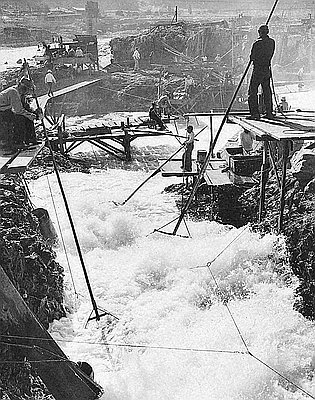This photograph shows representatives of the Confederated Tribes of the Umatilla Indian Reservation signing a financial compensation agreement for the inundation of Celilo Falls fishing sites by The Dalles Dam. Standing from left to right: Richard H. Betts, Superintendent of the Umatilla Reservation, and J. W. Elliott, former superintendent of the Warm Springs Reservation. Seated from left to right: Maudie Antoine, Umatilla General Council Chairman; Elias J. Quempts, Umatilla Vice Chairman; Louis McFarland, Umatilla Chairman; and Col. Thomas H. Lipscomb, U.S. Army Corps of Engineers District Engineer.
Although discussions between the Yakama, Umatilla, Warm Springs, Nez Perce, unaffiliated Columbia River Indians, and the U.S. Army Corps of Engineers began over the proposed construction of The Dalles Dam as early as 1945, the Army Corps did not enter into negotiations with the tribes in earnest until Congress failed to allocate construction funds for the dam in 1952. The delay was due to the Army Corps’ failure to make headway in resolving Indian claims to “usual and accustomed” fishing sites at Celilo Falls.
The participation of the Umatilla and Warm Springs tribes in negotiations was not looked upon favorably by the Yakama’s tribal council, who in 1951 passed a resolution claiming that they alone held treaty-based fishing rights at Celilo Falls. From their perspective, Celilo Falls was not a “usual and accustomed” fishing site for the Umatilla. Rather, the Yakama tribal council believed that the Umatilla fishers at Celilo were their guests. And while the Yakama conceded that Celilo Falls was once a “usual and accustomed” site for the Warm Springs tribes, they considered their claim nullified based upon an 1865 treaty that relinquished the latter tribes’ treaty-based fishing rights for $3,500 (the treaty was long held to be the result of dishonest swindling by a federal agent, since signatories believed they were signing a permit to fish off of the reservation). The Army Corps, however, considered both tribes to hold valid—though arguable—claims to fishing sites at Celilo.
The Umatilla and Warm Springs were the first to sign negotiated settlements with the Army Corps, each receiving approximately $3,700 per enrolled member of their affiliated tribes. The Umatilla received a total of $4,616,971 in compensation for their flooded fishing sites at Celilo Falls, while the Warm Springs tribes received a total compensation package of $4,451,784. Upon the Army Corps’ insistence, both tribes accepted the financial compensation for their drowned fishing sites and agreed to forgo their right to sue the federal government for additional compensation in the future. Neither tribe relinquished their treaty-based fishing rights through the negotiations.
Further Reading:
Lang, William. Great River of the West: Essays on the Columbia River. Seattle, Wash., 1999.
Schoning, Robert W., T. R. Merrell, and D. R. Johnson. The Indian Dip Net Fishery at Celilo Falls on the Columbia River. Portland, Oreg., 1951.
Written by Joshua Binus, © Oregon Historical Society, 2003.


